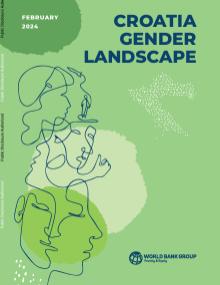In Croatia, the subject of gender equality has gradually moved from the fringes to the forefront of public discourse, reflecting both global trends and local imperatives. As of 2023, Croatia was still among the lowest-ranked EU countries for overall gender equality. Although Croatia’s overall Gender Equality Index score has improved over the past decade, domain-specific scores offer a more granular view of the remaining challenges.
The Croatia Gender Landscape 2024 highlights that throughout her life, a Croatian woman builds up significant human capital; however, this does not appear to fully translate into positive labor-market outcomes, income-generation opportunities, and decision-making power. Croatian girls outperform boys in accumulating human capital during their youth, but these endowments do not seem to fully benefit women in their later professional lives or in gaining decision-making power.
Lack of economic opportunities and flexible work arrangements, as well as social norms and stereotypes, are some of the key obstacles facing Croatian women in achieving their full potential in the political, economic and social spheres and achieving gender parity.
To address the gender gaps in Croatia and promote gender equality, the report proposes several policy recommendations for consideration.
The first recommendation highlights the need to expand affordable and high-quality child and elderly care services, to reduce the caregiving burden on women. This would allow women to be more active on the labor market. Access to and application of flexible work arrangements such as flexible working hours, and part-time work would support parents, especially during childbearing years. Upgraded parental leave policies could incentivize shared parenting responsibilities and reduce career interruptions for women. Targeted public awareness campaigns could challenge gender stereotypes and promote the value of diversity and inclusion in all spheres of society. Enforcement of equal pay legislation, promotion of programs and incentives for companies to promote women into leadership and high-power positions would support women’s career advancement. Finally, further strengthening of the legal framework would enhance the existing protections against discrimination, harassment and any form of gender-based violence.

